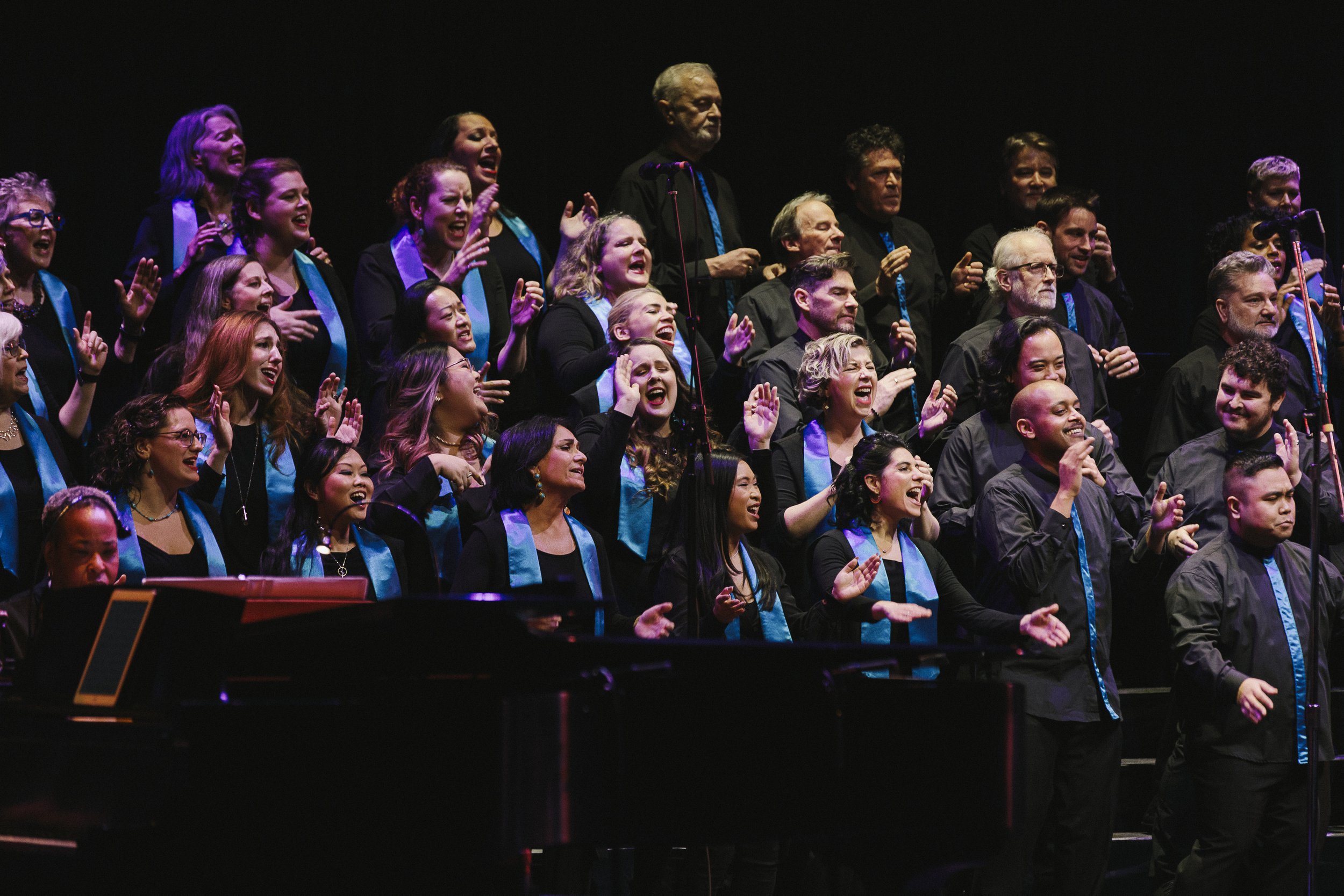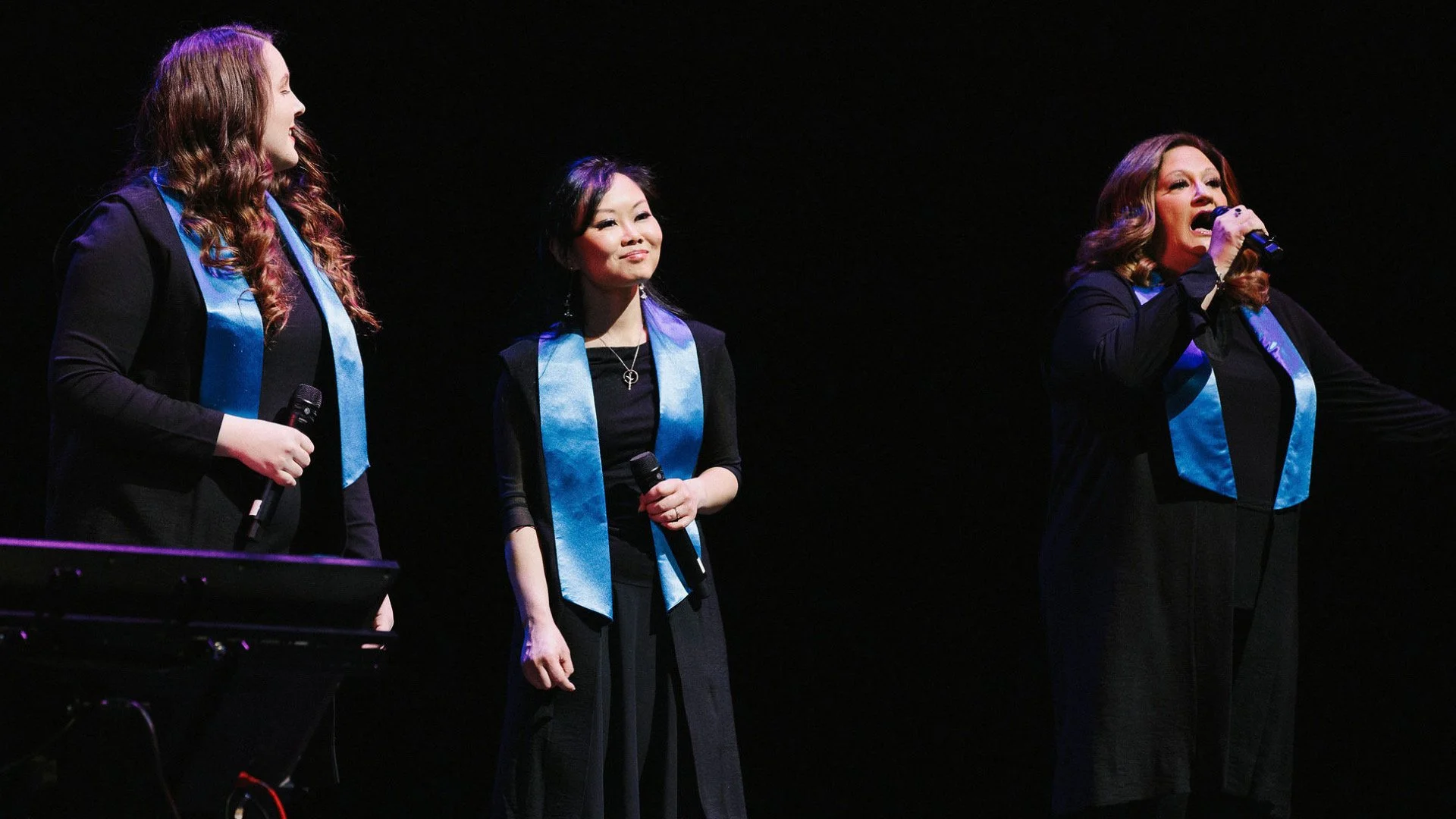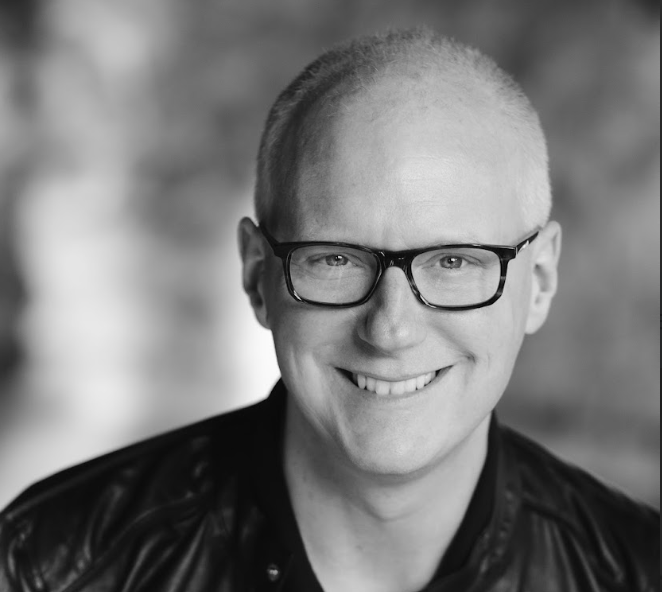Vancouver's Universal Gospel Choir unites in the healing power of music
The 70-member multi-faith ensemble’s Soulstice Concert: How I Got Over celebrates the human ability to rise to challenges
Universal Gospel Choir. Photo by Rachel Pick Photography
Universal Gospel Choir presents Soulstice Concert: How I Got Over on June 3 at 3 pm and 7:30 pm at Vancouver Unitarian Church
THE HEALING POWER of music is well known, and it’s something Tracey Gabert has experienced first-hand as a long-time member, soloist, and section leader with Vancouver’s Universal Gospel Choir. As she prepares for the 70-member multi-faith group’s annual Soulstice Concert, this year with a theme of “How I Got Over”, she can attest to how song helped her overcome one of the most difficult periods of her life.
Last year, Gabert found herself dealing with AL amyloidosis (light chain). The non-transmissible rare blood disorder occurs when plasma cells in the bone marrow change or mutate. She received the diagnosis after six months of intense testing, and learned that the condition affects 10 out of 1 million people and very often remains undetected until it has caused major organ damage. There is no cure; rather, there are treatments such as chemotherapy that can lead to remission. While she was in treatment, she had to take a break from singing with UGC but was able to return this past April, just in time for the upcoming show.
“When I first received the news, I was completely shocked,” Gabert tells Stir. “I remember one kidney specialist in the hospital telling how lucky I was because of the early detection and that I had a really good chance to fight this. I have never forgotten that….When you are faced with something like this, you have no choice. You have to fight hard, learn as much as you can, do all that you can to focus on your physical and mental health, and have hope that you will beat this.
“I am so thrilled to be singing in the Soulstice Concert,” Gabert adds. “My first rehearsal back in April I think I cried through most of it as I sang through the music and reflected on the lyrics, which somehow had so much more meaning to me than ever before. I am grateful for my remission, for the music, for the love and community that UGC has offered me…. I love what UGC stands for: inclusion, love, hope, joy, healing… The music and the lyrics are healing, but most of all it is the connections that are the most life-giving.”
At UGC’s Soulstice Concert: How I Got Over, the choir will share songs of resilience, hope, and love. The members come from different backgrounds, faiths, and walks of life, all united by their belief in the healing power of music.
“The concert is named after one of my favourite gospel songs,” Gabert says, referring to the piece by Vickie Winans. “It speaks to the resilience of the human spirit and having faith in something greater than ourselves. I have been through a great deal this past year, fighting for my life. and I really feel that I have gotten over a major hurdle that has left me so grateful and looking forward to what life has to bring.
“All of the repertoire for this concert is so beautiful,” she adds, “and I feel honoured to be back performing with my choir family.”
Tracey Gabert, far right. Photo by Rachel Pick Photography
UGC—which performed live with Alicia Keys at Rogers Arena during her North American tour and has released several albums—is backed by a four-piece band, which includes Grammy-nominated Jonny Tobin on keys, Johnny Andrews on drums, Jason Nickel on bass, and UGC director Lonnie Delisle on Hammond organ. Joining the choir as a featured soloist is two-time Juno-nominated Canadian recording artist Warren Dean Flandez, who will perform his original song “Joy”.
Delisle has been directing UGC since 2013. He too can relate to the theme of overcoming challenges. Music has always been a core part of his life, and by the age of 26, he was directing choir at a 3,000-member megachurch Langley.
“In the midst of the glorious music, I was also struggling with my sexual identity,” Delisle tells Stir. “I finally left the church in 2008 and came out not long after. I felt like I had to leave church music—which, for me, was gospel music—behind, except for times me and my other 'backslidden' friends would gather around the piano and sing songs similar to the ones we sing in UGC.
“When I discovered UGC, I was attracted to their multifaith, inclusive ethos,” he says. “I loved finding a place where directing gospel music, which has always been a huge part of me, could still be experienced. My husband is a tenor in the choir, and our dog comes to every rehearsal. It’s fun to do this as a family. I also love that we’ve made a home for a 'merry band of misfits'—people who don't necessarily belong in the church—some do, and that's great—or want anything to do with church, but love the genre of gospel and can perform it in an inclusive, affirming-of-all people, context.”
Lonnie Delisle.
Musically, Delisle loves that the group can perform everything from “hard core barn burners with an authentic gospel sound while maintaining great tone” to “a classical choral piece with pure vowels and great tone, once again, and excellent phrasing”. “I'm really proud of this, actually. Very few choirs can switch between genres and do it well the way UGC can.”
“One of the classic themes of gospel music is encouraging one another to keep moving forward, to endure, to thrive in the midst of struggle,” he adds. “Gospel music exhorts us to speak our truth, to stand up for justice while at the same time love our enemies. It offers a beautiful message that is a combination of grace and justice. To be clear: we are not trying to convert anyone to any religion. But we are grateful that we can be part of the experience of people’s healing from bad religion.”
Also on the program are “Ubi Caritas”, a classical choral piece by renowned Norwegian composer Ola Gjeilo; “Go Listen”, a fun, bluesy number by Lindsey Ray; “A Safe Place to Land” by Sara Bareilles about the plight of refugees; and “Somewhere”, a gospel-ballad version of the classic song from West Side Story, among other numbers.
“Music is so very healing and encouraging and unifying,” Delisle says. “This concert is a place where, through music, we can name the deep sorrows and even deeper joys that we all carry. It’s the kind of concert that gets past the brain and into the heart and into one’s bones. People get permission to laugh, cry, dance, and just sit and soak it in. From many reports, a UGC concert is a cathartic and healing 1.5-hour journey.
“I hope people come and have a blast,” he adds. “I hope people leave feeling like they’ve had an amazing, soul-nourishing experience. And I hope that through the power of music and shared experience, we can all leave encouraged and empowered to love each other, and our world, and the Earth, even just a tiny bit more than before.”
















